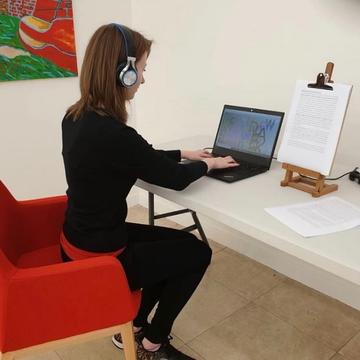dɪsˈlɛksɪə ˈɡeɪtweɪ (dyslexia gateway)
By OU student, Wendy Smith
I am a new AHRC OOCDTP student at The Open University (OU). I have recently transferred from Keele University from the AHRC NWCDTP consortium. The reason for this transfer was because my first supervisor Dr Manuella Blackburn took a position at the OU. My decision to transfer to the OU was made because it was important for my practice-based PhD study to continue working under the guidance of my first supervisor, as she specialises in my field of research. My PhD research is investigating the concept of homage in electroacoustic music.

Here, homage will be used as a means to create new compositions and sound installations to shine a spotlight upon forgotten and marginalised female figures in electronic music between 1940-75. This period is considered the founding period when the first studios and ‘schools’ of electronic music began to appear in Europe, along with the first outputs of musique concrète and electronic music. Historically, only the creative works from male electronic music pioneers appears documented in the literature, audio compilations and textbooks from this timeframe. Bringing attention to women’s contributions in this field through my own creative practice, enables a closer look at these unknown works and composers and offers an opportunity to reflect on their achievements.
Away from my PhD a previous interactive sound installation of mine dɪsˈlɛksɪə ˈɡeɪtweɪ (dyslexia gateway) (2016) has just been exhibited this October at Culture HQ (https://celebratehalton.co.uk/culture-hq/). Culture HQ is an artist led art gallery space in Halton. dɪsˈlɛksɪə ˈɡeɪtweɪ was included to mark this year’s Dyslexia Awareness Month 2021, as it highlights the dyslexic’s perspective. In particular, my first-hand account of interpreting, processing, and formulating the written, read and spoken English language.
Participants experienced my perception of dyslexia through their engagement and interaction when typing on a laptop keyboard. When participants typed on the laptop keyboard it demonstrated the breaking up of individual sounds and letters to assemble language through audio sounds and colourful visual graphical components. The vowel (a, e, i, o and u) letters on the laptop keyboard deliberately did not always match up with the corresponding sounds or imagery, as they are jumbled up with each other. This is because for some dyslexics, including myself, it can be hard to identify the difference between the vowel sounds in words, leading to confusion and frustration. Overall dɪsˈlɛksɪə ˈɡeɪtweɪ aims to show how a dyslexic’s mind can become cluttered, due to the complexity of their perceptions and processing of the English language.
Having dɪsˈlɛksɪə ˈɡeɪtweɪ showcased during Dyslexia Awareness Month was a huge honour for me, especially having dyslexia myself. This is because it is a month-long annual event that is aimed at providing further understanding and raising awareness about dyslexia. Culture HQ’s inclusion of dɪsˈlɛksɪə ˈɡeɪtweɪ in their gallery space has helped to spread awareness and generate conversations around dyslexia among the Halton community.
Culture HQ was the perfect place to have displayed this sound installation, as it is part of Halton’s Borough of Culture 2021 celebrations (https://celebratehalton.co.uk/about/). 2021 for Halton has been about increasing participation in high quality art activities, which provides participants with the opportunity to benefit from the fundamental role culture plays in improving health and wellbeing. It also continues to unite the Halton community, inspire creativity and support learning. Culture HQ is an important artist led space, for Halton’s community of artists to meet, network, learn and share their work. Having my work showcased in this space has provided me with opportunities to network with local artists from my area.
Raising awareness about dyslexia is important to me and is why I am a founding member of the EDIMS (Equality, Diversity and Inclusion in Music Studies) Physical, Sensory and Cognitive Differences Working Group (https://www.edimusicstudies.com/). This working group is committed to identifying, raising awareness of, and tackling inequalities experienced by staff and students with physical, sensory and cognitive differences in higher music education in the UK. The reason why I became an active member of this group was to help improve the representation of dyslexia in academia. Personally, for me it would have been hugely beneficial to meet other researchers early on in my academic career with dyslexia, to show me that is possible to have a career as a dyslexic researcher. This is why I have continued to seek performance opportunities for dɪsˈlɛksɪə ˈɡeɪtweɪ, to help illustrate visually and auditory what it is like living with dyslexia, as this may help someone.
dɪsˈlɛksɪə ˈɡeɪtweɪ has had multiple performances. It was first premiered at the Capstone Theatre in 2016, before the concert of virtuosic percussionist Joby Burgess. This work has continued to be performed across Halton through the support of Halton Libraries (Ditton, Widnes, Runcorn, and Halton Lea Library). Halton Libraries first included this sound installation in their Summer Reading Challenge (SRC) program of events in 2016. These SRC events were aimed at encouraging children aged 4 to 11 to read during the summer holidays. I was thrilled to showcase my installation during the SRC, as it allowed children to experience an aspect of what dyslexia can feel like. Halton Libraries was so pleased with the reception of my sound installation that they included it at Halton Lea Library’s Fun Palaces Community Art Day’s, first in 2016 and again in 2017. I was delighted that my installation was featured at Fun Palaces, as it is a nationwide yearly community event that celebrates and makes art and science accessible to all.
Even today, Halton Libraries (https://library.haltonbc.info/whats-on/) continues to support dɪsˈlɛksɪə ˈɡeɪtweɪ, as they provided me with the equipment to make it possible to present my sound installation at Culture HQ. I would like to take this opportunity to thank Halton Libraries for their constant support, collaboration and encouragement. I would encourage other musicians and artists to collaborate with Halton Libraries as they have always been an important facilitator in making art accessible to all.


